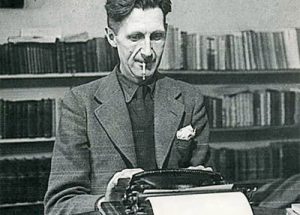George Orwell’s Four Writing Motives Reflect Today’s Publishing Industry
by Jonathan Smith // Blog Writer
 George Orwell, best known for such novels as 1984 and Animal Farm, is one of the most politically driven writers I have ever come across. Born in 1903, Orwell came of age during World War I and used his pen to quell totalitarianism and the rise of fascism during and post–World War II. In 1946, Orwell wrote an essay entitled “Why I Write,” in which he describes how his love for writing began developing at the age of five. Three motives—sheer egoism, aesthetic enthusiasm, and historical impulse—fueled him during his early years. A fourth motive—political purpose—inspired the majority of his later years. Orwell argues that all writers fit into one or a combination of these molds; in today’s publishing industry, most writers relate to multiple categories.
George Orwell, best known for such novels as 1984 and Animal Farm, is one of the most politically driven writers I have ever come across. Born in 1903, Orwell came of age during World War I and used his pen to quell totalitarianism and the rise of fascism during and post–World War II. In 1946, Orwell wrote an essay entitled “Why I Write,” in which he describes how his love for writing began developing at the age of five. Three motives—sheer egoism, aesthetic enthusiasm, and historical impulse—fueled him during his early years. A fourth motive—political purpose—inspired the majority of his later years. Orwell argues that all writers fit into one or a combination of these molds; in today’s publishing industry, most writers relate to multiple categories.
Sheer Egoism
Orwell’s definition of a writer driven by sheer egoism is one who has a chip on his or her shoulder, who strives to prove others wrong and be talked about. Orwell argues that people start living for others rather than themselves around the age of thirty, but “there is also the minority of gifted, willful people who are determined to live their own lives to the end, and writers belong to this class.” Perhaps Orwell had a sense of egoism about him as well, considering how he repeats the concept of “purple passages,” an overly elevated diction he used to narrate his work during adolescence. But egoism is difficult to detect in most writers’ work, seeing as the biases expressed may just be a character’s beliefs and not necessarily endorsed by the author. It’s easier to see actors, athletes, and musicians as egotistical because they are in the spotlight and often cannot operate behind a keyboard when performing their task.
Aesthetic Enthusiasm
Writers who embrace the beauty in prose and the external world are labeled under Orwell’s aesthetic enthusiasm motive. Those who feel inclined to share experiences that are equipped with valuable lessons also fall under this category. Orwell suggests that writers may have certain phrases they enjoy using, or perhaps “feel strongly about typography, [or] width of margins.” I most identify with this motive because I enjoy writing for the sake of writing, even when the stories I write are simply anecdotal. It may be a trite saying, but the idea that writers don’t get into the publishing industry to make money sounds as though it fits the mold of this and the next two categories.
Historical Impulse
Orwell keeps this motive concise, defining it as a “desire to see things as they are, to find out true facts and store them up for the use of posterity.” One of the more intriguing concepts history has to offer is the blend of myth and fact. Some try to present alternative facts, whereas writers driven by historical impulse seek actual evidence from the time periods they elucidate. As a writing major interested in pursuing a history minor, I cannot help but think of this as another relatable motive.
Political Purpose
Orwell utilizes the word “political” in its most far-reaching sense. Those who identify with the political purpose motive strive to alter the beliefs of people around them, especially their reading audience. According to Orwell, every concept has the potential to fall under the category of political purpose. He asserts, “The opinion that art should have nothing to do with politics is itself a political attitude.” One of the more politically driven writers I have encountered besides Orwell is Kurt Vonnegut, who explores topics as diverse as the Holocaust to the impacts of global warming on the earth. Though historical impulse and political purpose are similar in definition, political purpose appears to reflect modern struggles more so than historic conflicts.
People don’t have to write on a professional level in order to resonate with any of these motives. However, my observations of the modern publishing industry suggest that aesthetic enthusiasm and political purpose are the two leading motives. This is primarily due to process of elimination, because the intensity required when conducting historical research is reserved for only the most passionate among history buffs, and because I don’t like to label other writers as egotists. I do agree that most writers will find at least one motive to fit their identity; however, no one should ever remain glued to just one of these facets when creating literature.
